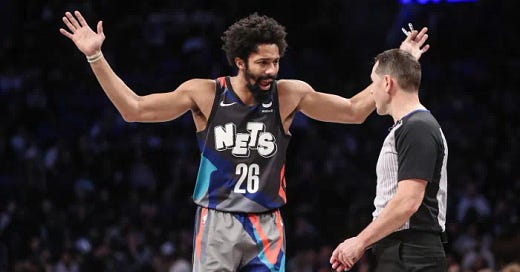Dinwiddie’s Nets Legacy (If Traded): A Self-Made Good Player Who Too Often Played As If He Was Great
If Tuesday night’s 119-107 loss to visiting Dallas was indeed Spencer Dinwiddie’s last game as a Net, at least he went out firing.
With trade rumors swirling around him and the deadline on the horizon, Dinwiddie took seven shots during Tuesday’s fourth quarter, which was seven times as many as he attempted in the contest to that point. And his four made buckets in that frame were more than he had in five of his previous seven full games.
I’m not in a position to comment about any NBA player’s effort, but from appearances, Dinwiddie has been in a funk for more than a month, displaying little of the dash, joy, and spirit that marked his first stint with Brooklyn from 2016-2020.
Back then, Dinwiddie, along with Joe Harris, were held up as the poster children for the Nets development program. Having been cut from the Pistons and scuffling through the then-called D-League, Dinwiddie, a 2014 second round pick, embraced his opportunity in Brooklyn. He had a hop to his step, and perhaps more confidence than was warranted by his efficiency. Still, he became known for his elite straight-line driving to the rim and knack for hitting late-game winners.
From my time as a credentialed reporter, I considered Dinwiddie a go-to interview for his ability to communicate, sometimes with humor, what life is like on an NBA court. He was ahead of the curve in terms of financial options like cryptocurrencies, even offering tokens based on his future earnings.
Unfortunately, the downsides of Dinwiddie’s game and personality (I have heard he has been derided as a know-it-all) have led to this, where the writing on the wall is so bold that if he isn’t traded before Thursday’s deadline, I have to wonder if the 30-year old and his expiring contract will eventually be bought out.
I say this with some sadness because not all of it—the league’s worst field goal percentage (20 games at 25 minutes per game minimum) and the unofficial title of the NBA’s worst lob passer--has been Dinwiddie’s fault. He was at his career best during the 59 games he played in Dallas because they had Luke Doncic and, for a brief period, Jalen Brunson monopolizing the ball. That afforded him a role as a secondary scorer, as opposed to being thrust into the lead guard (and crazy defensive) responsibility in Brooklyn.
It's not Dinwiddie’s fault that the Nets organization put too large a bet on the perpetually injured Ben Simmons to run the show. Dinwiddie wasn’t just the fallback point guard option, Head Coach Jacque Vaughn assigned significantly larger opponents for him to guard on defense that would have been tasked to the 6-foot 10 Simmons.
It was too much, even if Dinwiddie would never admit it. There were too many possessions earlier in the season where he would dribble around until the shot clock dwindled and then would be forced to heave one of his cringeworthy step-back or side-step three-pointers. Per NBA.com, only New York’s Julius Randle and Utah’s Jordan Clarkson have lower three-point field goal percentages on pull-ups this season (minimum 60 such attempts). By the way, when it’s too many, that’s the definition of shooting your team out of a game.
So I can understand if Vaughn asked Dinwiddie to be a bit more judicious with his three-point shot selection, but what I haven’t figured out is why there has been such a drastic decrease (approximately one third less) in his drives per game since January 1. That’s his bread and butter, because even if he can’t find a shot angle from the paint, he knows the value of how kicking the ball out to shooters initiates defensive scrambles into rotations that lead to higher-quality looks.
Maybe it’s his adjustment to how he’s being played by opposing defenses who are more inclined to give a weaker perimeter shooter some space to take away the bigger penetration threat. Or, again, Vaughn may have gotten fed up with all the times Dinwiddie had been missing in the restricted area and then argued with the officials over the non-calls in lieu of getting back in transition. Or maybe it’s a little of both.
In any event, for much of any particular recent game, Dinwiddie has been acting like a decoy on offense (his efforts in one-on-one defense have appeared to me to be mostly diligent). ESPN’s Zach Lowe went so far as to question in his column two weeks ago if Dinwiddie was “on some kind of strike.” Until Tuesday’s fourth quarter, it was a harsh but fair criticism.
Then Dinwiddie turned back the clock. He drove four times for baskets, including an and-one to get the Nets within a six-point margin with 5:22 remaining after being down by as many as 18 points earlier in the quarter.
On Brooklyn’s next possession, however, Dinwiddie dribbled down the shot clock without a single pass and then bricked a three-pointer. The Mavericks pulled away thereafter. Fittingly, Dinwiddie’s last two plays in the final two minutes of garbage time went down the same way--a driving dunk and another hurried three-pointer that didn’t go in.
I don’t know if Dinwiddie will be traded on Thursday. It’s probably in both parties’ best interests to get something done, even if the Nets use his contract to facilitate another deal. I do know that the difference between the merely good and great NBA players is consistency. It’s the difference between the ability to make difficult shots versus the efficiency in doing so. In Dinwiddie’s case, I’m going to remember him more as a self-made good player who, for better or worse, played with the mindset of someone who is great.



